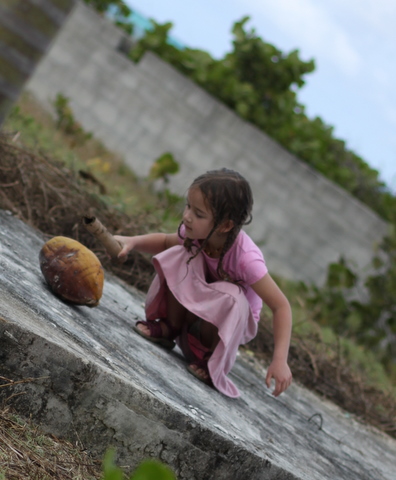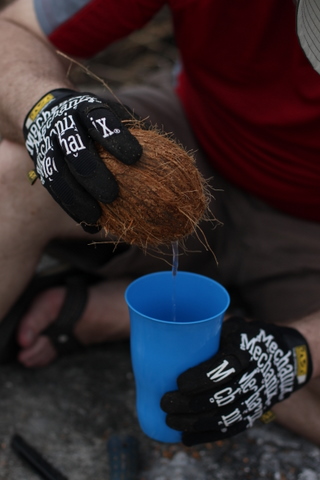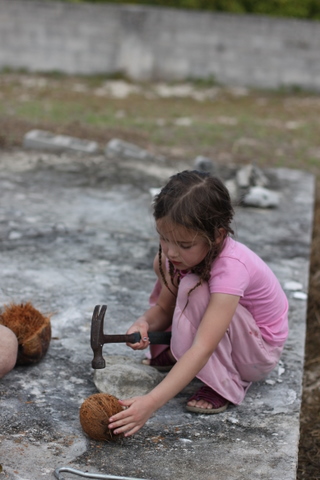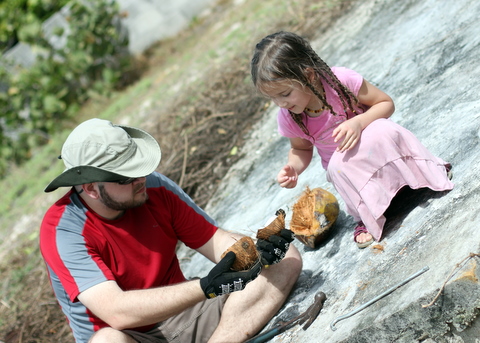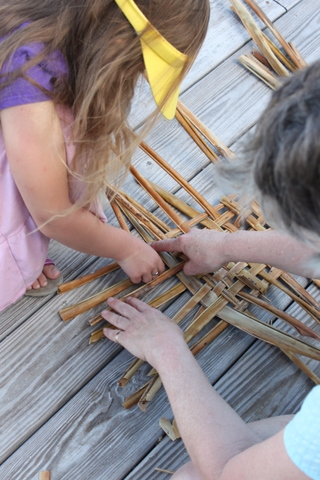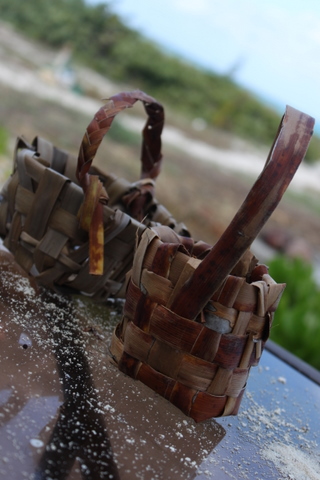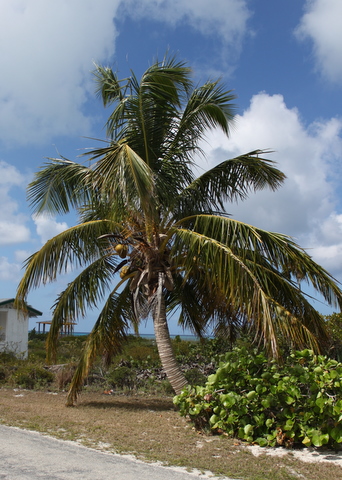 On our trip to San Salvador Island, we stayed at Coconut Cottage which indeed was home to several coconut trees. Not being the kind of people to shy away from a free food source, Alex and Lil collected several big heavy coconuts and commenced to opening.
On our trip to San Salvador Island, we stayed at Coconut Cottage which indeed was home to several coconut trees. Not being the kind of people to shy away from a free food source, Alex and Lil collected several big heavy coconuts and commenced to opening.
Extracting the Coconut
They instantly discovered that opening a coconut is a tricky thing. Like a twenty-something that refuses to leave her parent's home, the sweet meat clings to its shell. Two shells, actually.
The outer husk is smooth and thick. Lil beat on it with a length of beach combed bamboo to no avail. Alex tried a rock, then a screwdriver, then the corner of the cement patio, and his knife. 
I admit that watching the two of them working at this task over thirty minutes was a bit like watching a pair of monkeys discovering tools. The husk eventually splintered into packed fibrous sections.
Under the husk is the hard dense inner shell. The meat grows attached to this shell but if one shatters it with a hard blow, the nutritious coconut water would be lost. Instead, Alex drove a screw driver through one of the eyes with a hammer.
The resulting water is alluring - sweet, warm, and slightly salty from uptaking ocean water. Proponents herald coconut water as a natural electrolyte replacement. We enjoyed it with lime and rum in a perfect vacation cocktail.
With a few smashes from the hammer and rock, Lil and Alex broke into the shell to reveal bright white meat. (Also the sun came out. Ever changing light makes for challenging photography!)
Fresh coconut meat is juicy, sweet, and filling. It clings ever-tight to the shell. We used our teeth as rasps to shave off the meat and then tried a strong knife to pry off bigger pieces. At the suggestion of Internet guides, we froze some and baked it - the latter proving much more successful at loosening the goodstuff from the shell.
Lil's Field Log Entry
"Coconut isn't what you think it is. It's not just a brown shell. It has food inside that's white that's called coconut meat and some juice inside that's called coconut water. The brown coconut lives in a green big shell that's actually made out of wood. And coconuts grow on trees. Not any kind of trees, palm tree."
More Coconut Fun in the Palms
A coconut tree has more to give than just fruit. The palm fronds are dense, thick material just waiting to be transformed.
Alex's mother Deb, a fiber artist, did not hesitate to collect and start working with them. She first wove with full fronds.
A basket weaver happened to be in town the next day and revealed that Bahamian women typically split the fronds in half and remove the central pin-like fiber before weaving. This allows the fiber to lay flat and be more easily manipulated.
Incorporating this small change, Deb and Lil created several placemats. We dried them outside to be sure that any insects who might be inhabiting them wouldn't take over the house. Stowed in checked luggage, customs officials allowed us to transport them home.
One afternoon, Deb and I worked for nearly an hour to weave two small funky baskets. Souvenir baskets, like the one Lil bought, are constructed of woven fiber fabric.
Fresh coconuts rock. We are thrilled to have enjoyed them on vacation.
NB. The latest National Geographic Magazine reveals that we can mail coconuts, package free! We are totally doing this on our next tropical vacation!
Contrary to what you might think given the pictures, this post was not sponsored by Mechanix Gloves

